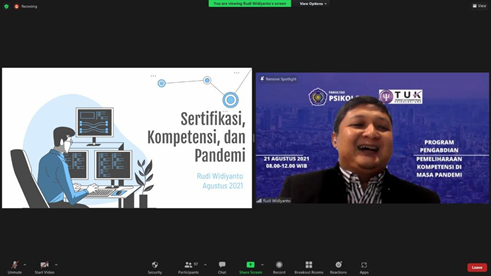Optimalisasi Kompetensi Individu di Era Pandemi melalui Edukasi Daring Competence Optimalization in the Pandemic Era through Online Education
Main Article Content
Abstract
The pandemic situation and digital acceleration have altered ideas on the significance of competence. Various offline restrictions that occur can be utilized to maximize previously acquired competencies. Individuals are responsible for their competency development and must take the initiative to use it. However, this does not preclude the potential that this may occur in response to commands from superiors. This community service aims to provide education on how to maximize competency and the types of activities that may be conducted via the online platform Zoom. A total of 97 workers or employees from various fields participated in the activity. The effectiveness of the activity can be determined by evaluating the activity's participants. According to the evaluation results, 88.2% of the participants thought there was greater insight regarding relevant competencies. The following recommendation for education providers is to investigate offline implementation if situations permit overcoming the restrictions of resource-participant contact.
Downloads
Article Details

This work is licensed under a Creative Commons Attribution-ShareAlike 4.0 International License.
Authors who publish with this journal agree to the following terms:
- Any article on the copyright is retained by the author(s).
- Author grant the journal, right of first publication with the work simultaneously licensed under a Creative Commons Attribution License that allows others to share work with acknowledgment of the work authors and initial publications in this journal.
- Authors are able to enter into a separate, additional contractual arrangements for non-exclusive distribution of published articles of work (eg, post-institutional repository) or publish it in a book, with acknowledgment of its initial publication in this journal.
- Authors are permitted and encouraged to post their work online (e.g., in institutional repositories or on their websites) prior to and during the submission process, as can lead to productive exchanges, as well as earlier and greater citation of published work.
- The article and any associated published material is distributed under the Creative Commons Attribution-ShareAlike 4.0 International License
References
Ahmad, A. R., Yee, K. S., Isa, K., Soon, N. K., & Sapry, H. R. M. (2019). The competency level of indonesian migrant workers in Malaysia. International Journal of Engineering and Advanced Technology, 8(5), 314–317. https://doi.org/10.35940/ijeat.E1044.0585C19
Akkermans, J., Richardson, J., & Kraimer, M. L. (2020). The Covid-19 crisis as a career shock: Implications for careers and vocational behavior. Journal of Vocational Behavior, 119, 103434. https://doi.org/10.1016/j.jvb.2020.103434
Bratton, V. K., Dodd, N. G., & Brown, F. W. (2011). The impact of emotional intelligence on accuracy of self-awareness and leadership performance. Leadership and Organization Development Journal, 32(2), 127–149. https://doi.org/10.1108/01437731111112971
Dirani, K. M., Abadi, M., Alizadeh, A., Barhate, B., Garza, R. C., Gunasekara, N., et al. (2020). Leadership competencies and the essential role of human resource development in times of crisis: a response to Covid-19 pandemic. Human Resource Development International, 23(4), 380–394. https://doi.org/10.1080/13678868.2020.1780078
Fan, Z., & Fan, X. (2021). Effect of Social Support on the Psychological Adjustment of Chinese Left-Behind Rural Children: A Moderated Mediation Model. Frontiers in Psychology, 11, 604397. https://doi.org/10.3389/fpsyg.2020.604397
Gurevitch, L. (2021). The spectacle of competence: global pandemic and the redesign of leadership in a post neo-liberal world. Cultural Studies, 35(2–3), 489–504. https://doi.org/10.1080/09502386.2021.1898023
Hite, L. M., & McDonald, K. S. (2020). Careers after COVID-19: challenges and changes. Human Resource Development International, 23(4), 427–437. https://doi.org/10.1080/13678868.2020.1779576
International Labour Organization. (2021). Skills development in the time of COVID-19: Taking stock of the initial responses in technical and vocational education and training. https://www.ilo.org/skills/areas/skills-training-for-poverty-reduction/WCMS_766557/lang--en/index.htm
Kreibich, A., Hennecke, M., & Brandstätter, V. (2020). The Effect of Self-awareness on the Identification of Goal-related Obstacles. European Journal of Personality, 34(2), 215–233. https://doi.org/10.1002/per.2234
Lee, M. T., & Raschke, R. L. (2016). Understanding employee motivation and organizational performance: Arguments for a set-theoretic approach. Journal of Innovation and Knowledge, 1(3), 162–169. https://doi.org/10.1016/j.jik.2016.01.004
Mustajbašić, E., & Husaković, D. (2016). Impact of Culture on Work Motivation: Case of Bosnia and Herzegovina. Journal of Business & Economic Policy, 3(3), 79-87.
Muttaqin, G. F., Taqi, M., & Arifin, B. (2020). Job Performance During COVID-19 Pandemic: A Study on Indonesian Startup Companies. Journal of Asian Finance, Economics and Business, 7(12), 1027–1033. https://doi.org/10.13106/JAFEB.2020.VOL7.NO12.1027
Pallathadka, H. (2020). Influence of Organizational Culture on Employee Behavior. European Journal of Molecular & Clinical Medicine, 7(10), 4331–4341.
Rietveld, J. R., Hiemstra, D., Brouwer, A. E., & Waalkens, J. (2022). Motivation and productivity of employees in higher education during the first lockdown. Administrative Sciences, 12(1), 1. https://doi.org/10.3390/admsci12010001
Rijanti, T., Kasmari, Prabowo, R. E., & Sukmaningrum, D. (2021). The Role of Moderation of Organizational Culture on the Effect of Motivation and Compensation on Employee Performance: Studies on District Office the Ex.Kawedanan Boja Region (Singorojo, Boja, Limbangan) Kendal Regency. Advances in Economics, Business and Management Research, 169, 368–373. https://doi.org/10.2991/aebmr.k.210311.073
Schaffar, B. (2021). Competent uses of competence: on the difference between a value-judgment and empirical assessability. Nordic Journal of Studies in Educational Policy, 7(2), 55–64. https://doi.org/10.1080/20020317.2021.1958993
Siahaan, L. I., Imran, A. I., & Diniati, A. (2021). Effect of organizational behavior and organizational climate on employee job satisfaction in PT. Eagle Indo Pharma. Advances in Social Sciences Research Journal, 8(3), 352–362. https://doi.org/10.14738/assrj.83.9873
Sigursteinsdottir, H., & Karlsdottir, F. B. (2022). Does Social Support Matter in the Workplace? Social Support, Job Satisfaction, Bullying and Harassment in the Workplace during COVID-19. International Journal of Environmental Research and Public Health, 19(8), 4724. https://doi.org/10.3390/ijerph19084724
Tušl, M., Brauchli, R., Kerksieck, P., & Bauer, G. F. (2021). Impact of the COVID-19 crisis on work and private life, mental well-being and self-rated health in German and Swiss employees: a cross-sectional online survey. BMC Public Health, 21(1), 741. https://doi.org/10.1186/s12889-021-10788-8
Yu, J., & Wu, Y. (2021). The impact of enforced working from home on employee job satisfaction during COVID-19: An event system perspective. International Journal of Environmental Research and Public Health, 18(24), 13207. https://doi.org/10.3390/ijerph182413207
